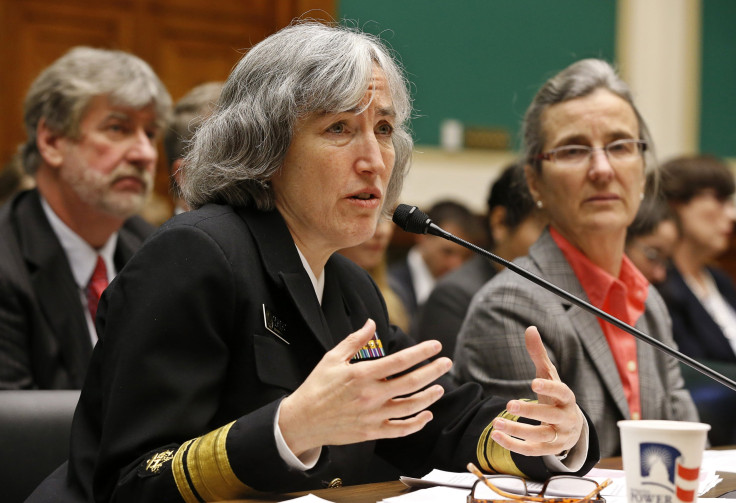Measles Outbreak 2015: What Happens When Anti-Vaxxers Have Politicians' Support?

Now that the measles vaccination debate has entered the political realm, government dollars will have to be spent to contain the highly contagious disease, identify infected people and wage public awareness campaigns. That's money that could have gone to other priorities had politicians stayed out of issues where there is no controversy among medical professionals, health care leaders said.
U.S. Sen. Rand Paul, R-Ky., an ophthalmologist by trade, fueled the flames of the measles vaccination debate Monday when he said in an interview he had heard of cases where children developed “profound mental disorders” after being vaccinated against infectious diseases. Paul, a potential 2016 Republican candidate for president, wasn’t advising against vaccinations, but said parents should have a choice whether to inoculate their children. There is no evidence of vaccines causing conditions like autism, the disorder most linked to shots by the anti-vaccination community.
“It’s highly irresponsible,” said Dr. Daniel Bausch, an associate professor of tropical medicine at the Tulane University School of Public Health and Tropical Medicine in New Orleans. “If you’re going to say something like that, that of course is going to have very significant influence. If I believed him and I believed [that vaccinations cause autism], I probably wouldn’t vaccinate my kid.”
In January, 102 measles cases were reported in the U.S. in 14 states, with an outbreak at Disneyland in California representing 92 percent of all cases, according to the Centers for Disease Control and Prevention. In 2014, there were 644 measles cases in the U.S. -- the most since measles was eliminated in the country in 2000, the agency said. Measles is among the most highly contagious viruses in the world. For example, someone can become infected by entering a room two hours after someone with measles walked out of it.
Paul wasn’t the only potential GOP 2016 candidate weighing in on measles. New Jersey Gov. Chris Christie also stirred the controversy Monday when he said the government shouldn’t dictate whether the vaccinations are necessary, then made an about-face and said parents should inoculate their children from measles. CDC Director Dr. Thomas Frieden tried to set the record straight in a tweet on Monday:
#Measles is very contagious & spreads through air when an infected person coughs or sneezes. Get protected w/ vax. http://t.co/aodkp8FaDS
- Dr. Tom Frieden (@DrFriedenCDC) February 2, 2015Some of the costs associated with the measles outbreak include trying to find people who may have been exposed to the disease, quarantining those individuals and treating them. “Because it’s preventable, this is money that didn’t need to be spent at all,” Bausch said. Then there are also the costs of reinforcing health messages. “We have to go back and say, ‘Keep vaccinating your child,’” Bausch said.
And that’s just on the federal level. At the state and local level, schools will have to monitor children for measles and some may have to close because of an outbreak. At the university level, colleges will have to clean dorms. Parents will also have to stay home from work to care for their ill children and pay for medical care for which they would not be on the hook if they had vaccinated their kids. Local police departments will have to enforce quarantines, said Alexandra Stewart, a professor of public health at the Milken Institute School of Public Health at George Washington University in the District of Columbia.
“When we have these kinds of outbreaks, it costs taxpayers millions and millions of dollars. State and local public health departments -- they have to bear the weight of this -- are going to have to redistribute resources from other important areas over to the measles discussion,” she said. Unlike the federal government, “state governments can’t run on deficits, so they have to find that money somewhere and it has to come from someplace else.”
The total cost of the 2015 measles outbreak is to the federal government is unclear. The CDC did not immediately respond to a request for comment, but the 2011 measles outbreak in the U.S. involving 107 cases cost $5.3 million. Seth Mnookin, a science writing professor at the Massachusetts Institute of Technology in Boston, cited a study that said the bill is $10,000 just on containment for each measles case.
"In regard to measles, it creates an incredible public health burden in terms of how much money is spent on containing each case of measles, making sure people are quarantined," Mnookin told NBC News. "One study has shown it costs $10,000 per case. So when you're talking about ... hundreds of cases, that's real money that could be spent towards keeping people healthy in other ways."
The measles vaccination debate is hardly the first time the worlds of medicine and politics have collided. Some Republicans used the cases of the Ebola virus in the United States to drum up hysteria about how illegal immigration was exacerbating the problem despite no evidence. Embryonic stem cell research, which has the potential to cure a number of diseases, has also become politicized, with conservative Republicans arguing taking stem cells from embryos is tantamount to abortion because the embryos are destroyed in the process.
Republican doubts on vaccinations may be more about placating their base than being sympathetic to the anti-vaccination community, a growing group that represents only a small percentage of Americans, Stewart said. “It seems to me [Christie’s] running for president and Republicans are anti-government and they think this is government intrusion,” she said.
© Copyright IBTimes 2024. All rights reserved.






















